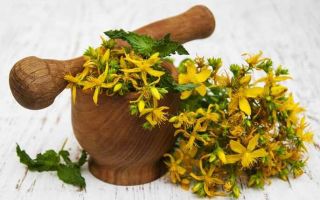Content
- 1 What does St. John's wort look like and where does it grow?
- 2 The chemical composition of St. John's wort
- 3 Why is St. John's wort useful for the body?
- 4 What diseases does St. John's wort help
- 5 How to drink and use St. John's wort for medicinal purposes
- 5.1 St. John's wort decoction
- 5.2 Alcohol tincture of St. John's wort for depression
- 5.3 Infusion for gastritis and heartburn
- 5.4 Ointment and infusion of St. John's wort for the treatment of vitiligo
- 5.5 Hypericum infusion for the liver
- 5.6 Strong decoction of St. John's wort for the treatment of alcoholism
- 5.7 St. John's wort juice for wound healing
- 6 Properties of St. John's wort tea
- 7 Properties and uses of St. John's wort oil
- 8 The use of St. John's wort in cosmetology
- 9 St. John's wort in cooking
- 10 Contraindications and side effects of St. John's wort
- 11 Harvesting and storage of St. John's wort
- 12 Conclusion
- 13 Opinion and feedback of doctors on the treatment of St. John's wort
- 14 Reviews of people on the use of St. John's wort for medicinal and cosmetic purposes
The benefits and harms of St. John's wort is an interesting question for those who are fond of traditional medicine. The plant is found very often in home recipes - in order to use it correctly, you need to know as much as possible about the properties of St. John's wort.
What does St. John's wort look like and where does it grow?
The plant grows in regions with a temperate climate, throughout the Northern Hemisphere, in Russia and European countries, in the Mediterranean. It can usually be found in clearings, forest clearings and dry meadows.
On the territory of Russia, mainly St. John's wort and tetrahedral are widespread. The plant can reach 70 cm in height, the stem is covered with small oblong leaves on very short petioles. The grass blooms with bright yellow flowers, single or collected in umbrellas. The flowering period is in the summer from June to August.
The chemical composition of St. John's wort
The beneficial properties of the plant are explained by its rich composition, which includes:
- vitamins C and A;
- vitamin E;
- rutin and choline;
- quercetin;
- nicotinic acid PP;
- saponins;
- hypericin and hyperforin;
- phytoncides and tannins;
- resins and essential oil.
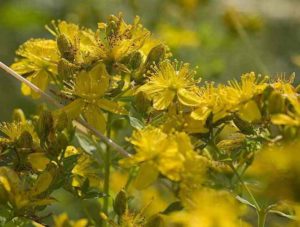
Why is St. John's wort useful for the body?
The benefits of St. John's wort for the human body are manifested in the fact that the plant:
- has an antiseptic and antibacterial effect;
- helps to heal wounds, ulcers and irritations faster;
- helps to fight depressive conditions - the benefits of St. John's wort are great for the nervous system;
- serves as a good diuretic and choleretic;
- relieves inflammation and pain with rheumatic ailments.
St. John's wort increases or decreases blood pressure? The properties of the plant will prove to be valuable for hypotonic patients, since the pressure from taking the herb will go up. But the plant can harm hypertensive patients.
Hypericum properties for women
The benefits of St. John's wort for a woman's body consist, first of all, in the fact that it helps with gynecological diseases. The plant is used to normalize the cycle and to improve well-being during menopause, with erosion and uterine myoma. The medicinal herb is used in the treatment of female infertility.
Sometimes the plant can be harmful - women should not use it in large quantities.St. John's wort increases testosterone levels, which can negatively affect a woman's appearance.
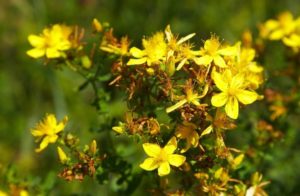
Hypericum properties for men
The benefits and harms of St. John's wort for men are closely related. On the one hand, the plant acts as an anti-inflammatory agent and helps with genitourinary ailments, with inflammation of the prostate gland. But with prolonged use, harm may appear - problems with potency will begin.
What diseases does St. John's wort help
Traditional medicine uses the beneficial properties of the plant for the following ailments:
- rheumatism and joint diseases;
- SARS, flu and colds;
- hemorrhoids and inflammations in the organs of the genitourinary system;
- chronic ailments of the liver and stomach, inflammation of the bladder.
St. John's wort is very valuable for the heart, it has a strengthening effect on this organ. The beneficial effect of the plant on the skin is widely known.
How to drink and use St. John's wort for medicinal purposes
In order for St. John's wort in folk medicine to bring maximum benefit and not cause harm, it must be applied correctly. There are proven home remedies recipes.
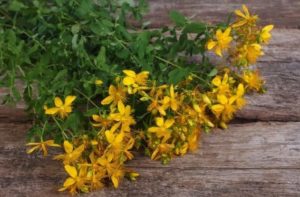
St. John's wort decoction
In the treatment of many ailments, the properties of St. John's wort decoctions are used. To get a decoction, you need:
- pour a glass of hot water 1.5 large tablespoons of dry herbs;
- place in a water bath;
- while stirring, cook for about half an hour.
Useful broth is filtered and cooled to a warm state. A decoction of St. John's wort is used for gastric and intestinal diseases - it is drunk 2 large spoons each time before eating. With a decoction, you can rinse your mouth and throat with inflammation and infections, they are also treated with a runny nose and sinusitis, in this case, the nasal sinuses are washed three times a day.
Alcohol tincture of St. John's wort for depression
Alcohol tincture is prepared as follows:
- a handful of dry raw materials are poured with vodka or alcohol;
- close with a lid and put in a dark place;
- after 3 days, filter and drink 12 drops three times a day.
The total duration of treatment is a month - during this time, the benefits of moonshine on St. John's wort will be fully manifested.

Infusion for gastritis and heartburn
The infusion of the plant on the water is good for diseases of the stomach and intestines, gastritis and colitis, for female ailments and hypotension. Prepare the tool like this:
- 15 g of dry collection is poured with 200 ml of boiling water;
- cover the container and put it in a dark place for 4 hours;
- filter and drink 1 large spoon three times a day before meals.
The benefits of St. John's wort will also manifest itself in rinsing the throat or mouth for sore throat and inflammatory gum disease.
Ointment and infusion of St. John's wort for the treatment of vitiligo
Skin pigmentation disorders, or vitiligo, can be successfully treated with a medicinal plant. Therapy is carried out by two means - plant infusion and ointment.
- To create an infusion, 1 teaspoon of raw materials is poured with a glass of boiling water, insisted in a teapot for half an hour, filtered and drunk three times a day, 1 large spoon. You need to continue taking the drug for 3 weeks, then take a break for a week. In total, you need to drink 8 courses of infusion.
- Homemade ointment is made from fresh plant flowers, they are tamped tightly into a glass container, poured with olive oil and placed in a lighted place for 2 weeks. After 2 weeks, the oil is squeezed out of the jar, fresh flowers are again tamped into it, poured with the same oil and left for 2 weeks. The procedure must be done 5 times, as a result the olive oil will thicken and turn into a creamy mass. Once a day, this remedy is applied to the affected areas of the skin, leaving the ointment for half an hour.
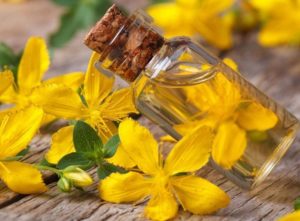
Hypericum infusion for the liver
To cleanse the liver, prepare the following infusion:
- 1 large spoonful of dry grass is poured with boiling water;
- 4 hours insist in a dark place, and then filter;
Drink chilled.
Useful infusion should be taken in the morning on an empty stomach in the volume of half a glass, and then drink another 2 large spoons three times a day before meals. In total, therapy takes a week, so as not to harm health, the infusion should not be drunk for too long.
Strong decoction of St. John's wort for the treatment of alcoholism
It is necessary to prepare a broth of increased strength - pour 2 cups of boiling water over 4 large tablespoons of dry herbs. The agent is heated for half an hour with a steam, then cooled and drunk 2 large spoons in the morning and evening. In total, the broth must be taken for at least 2 weeks.
St. John's wort juice for wound healing
The plant's antiseptic and restorative properties promote the healing of ulcers, wounds and burns. It is necessary to grind or grind fresh leaves, and then squeeze the juice that has emerged through cheesecloth. This juice is applied to the affected areas several times a day.
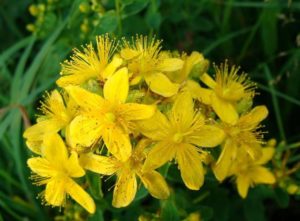
Properties of St. John's wort tea
The healing properties of St. John's wort are often used in tea - the plant serves as an excellent prevention of colds and helps in the treatment of influenza and SARS. The medicinal herb has anti-inflammatory and strengthening properties. The benefits of St. John's wort tea are especially great in autumn and winter, when the body is weakened against the background of a lack of sun and vitamins.
How to make classic St. John's wort tea
The recipe for brewing a classic plant-based tea looks very simple. A teaspoon of herbal collection should be placed in a teapot and covered with boiling water, and then insist for 10 minutes. The plant can be brewed separately, or you can mix it with black or green tea, there will be no harm from this.
St. John's wort and rosehip tea for colds
Tea based on a plant with the addition of rose hips has good strengthening and antipyretic agents. To 1 teaspoon of dry collection, you need to add 2 tablespoons of oregano herb and a few rose hips. The collection is poured with boiling water and insisted for about 20 minutes - rose hips need more time to give up their beneficial properties.

Anti-stress tea with St. John's wort and lemon balm
The plant goes well with tonic and invigorating lemon balm. Dry herbs are mixed in equal proportions, 1 teaspoon each, add 1 teaspoon of linden to the collection and brew with boiling water.
Properties and uses of St. John's wort oil
Another useful plant-based remedy is the healing oil.
- The oil has excellent healing properties, it is used in the treatment of wounds, burns and even bedsores.
- The tool helps the quick healing of mucous membranes, so 1 large spoonful of oil can be taken in the morning with stomach ulcers or rinsed with it in case of gingivitis and stomatitis.
Oil is often found in cosmetics, both purchased and homemade. The use of St. John's wort oil is that the extract moisturizes and rejuvenates the skin, relieves irritation, and strengthens the hair.
Making St. John's wort oil at home
You can make the healing oil yourself. For this you need:
- pour 20 g of fresh leaves and flowers with 200 ml of any vegetable oil;
- insist for 6 weeks in a dark place, stirring regularly;
- drain the finished product through cheesecloth.
The extract of St. John's wort should have a ruby color and have a bitter taste.
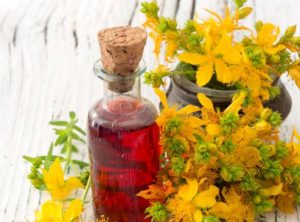
The use of St. John's wort in cosmetology
The beneficial properties of the plant are used not only for the treatment of ailments, but also for beauty care. The medicinal herb has a cleansing and strengthening effect on hair and skin.
For acne
To get rid of acne and pustules, you can wipe your face with a decoction of the plant. A cotton pad is moistened in the broth, squeezed a little, and then the inflamed skin area is blotted with gentle movements.
For acne
To eliminate blackheads and blackheads, you need to wash your face every evening with the infusion of the plant, made at the rate of 1 large spoonful of raw materials per glass of boiling water. You need to apply a useful product on clean skin; do not wipe your face with a towel after washing.
For skin aging and wrinkles
A plant-based lotion has a rejuvenating and firming effect. For its preparation, they first make an infusion, and then add 1 large spoonful of vodka to it and wipe their face with this tool every evening.
They also refresh the skin well and remove wrinkles by rubbing with a frozen broth. Strain the drink, cool it, pour it into special ice molds and put it in the freezer. The resulting cubes wipe the face in the morning, the frozen broth improves blood circulation and improves skin elasticity.
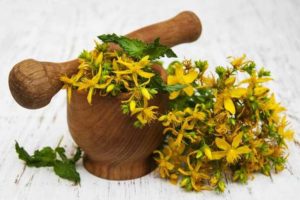
For oily skin
With oily skin, a decoction of St. John's wort will benefit - they need to wash themselves daily in the morning and evening.
A mask made from St. John's wort will also bring a beneficial effect. 2 large tablespoons of the plant are poured with 4 tablespoons of boiling water, insisted for half an hour, and then they put the softened gruel on the face and hold for 10 minutes.
For baldness and dandruff
If you rinse your hair with St. John's wort after each shampooing, then after a few weeks the problem of dandruff will disappear, or at least it will become less pronounced.
The benefits of St. John's wort infusion will appear with internal use against hair loss - you need to drink the remedy twice a day for a third of a glass. You can also regularly wash your curls with St. John's wort, complex therapy will strengthen the roots and stop hair loss.
With cracked heels
The dry leaves of St. John's wort are poured with 2 liters of water and boiled for about 5 minutes over low heat, and then the broth is poured into a small basin and cooled to a temperature of 45 degrees. In the broth, you need to steam your legs three times a week, a useful remedy will help heal cracks in the heels and strengthen the skin on the feet.

St. John's wort in cooking
The main field of application of the plant remains medicine. However, a useful herb is used in cooking. Dry pick or powder add:
- in salads and kebabs;
- chops and minced meat;
- to fish and meat dishes.
Sometimes the plant can be found in alcoholic beverages, very often it is used in herbal teas.
Contraindications and side effects of St. John's wort
The health benefits and harms of St. John's wort are inseparable from each other. You cannot use plant-based products when:
- hypertension;
- increased sensitivity of the skin to the sun's rays;
- individual plant allergy;
- taking contraceptives, antibiotics, heart medications, antidepressants;
- serious mental illness;
- poor appetite and a tendency to constipation;
- problems with potency in men.
It is forbidden to drink medicinal herb after organ transplantation - the harm will be in the fact that the plant interferes with tissue engraftment. Also, the plant is harmful before operations that require anesthesia, since it does not combine well with anesthetic drugs.
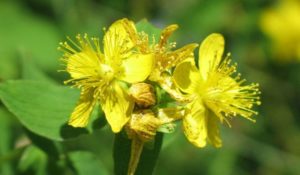
Can St. John's wort during pregnancy
While carrying a child, women can only apply the plant externally. Decoctions, infusions and teas based on it are strictly prohibited, since they can harm the fetus and even lead to miscarriage.
At what age can St. John's wort be given to children
Useful ointments, wipes, rinses and baths with a medicinal plant are allowed for children from 5 years old. St. John's wort decoction for children and other means for internal use can be given only after 12 years. The properties of the plant can harm the child and negatively affect, first of all, his nervous system.
Harvesting and storage of St. John's wort
It is best to harvest the leaves and flowers of a useful plant in June, at the very beginning of flowering. Cutting the grass should be closer to the ground. The collected raw materials need to be dried, usually the grass is tied in small bunches and hung in the shade or laid out in a well-ventilated dry place. For the winter, St. John's wort is put in linen or paper bags.
Subject to the rules, the plant retains its benefits up to 2 years.

Conclusion
The benefits and harms of St. John's wort are a matter of contraindications. If there are no strict prohibitions on the use of the plant, in moderation it will be beneficial and help to cope with many diseases.
Opinion and feedback of doctors on the treatment of St. John's wort
The medicinal properties of the plant are officially recognized by traditional medicine. Qualified doctors often prescribe decoctions and infusions for anxiety disorders in patients, for chronic gastritis and stomach ulcers, for rheumatic diseases and migraines. The healing plant gets good reviews, since it heals light disorders of the body effectively.
At the same time, doctors recommend not to take medicinal herb at the same time as pharmacological agents - this reduces the effectiveness of the latter.
Reviews of people on the use of St. John's wort for medicinal and cosmetic purposes

